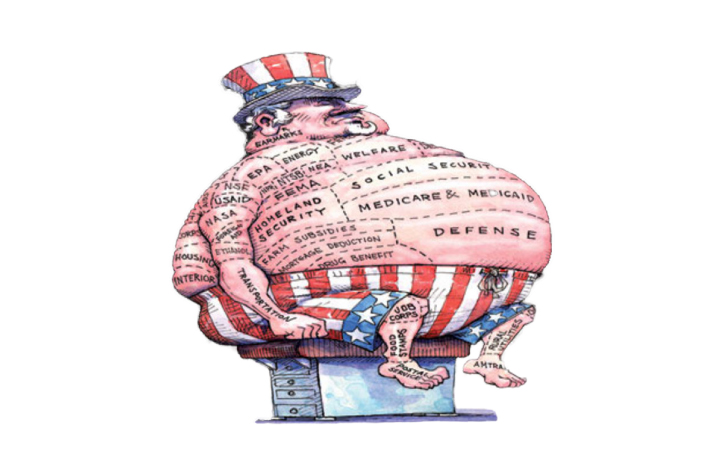Conservative opposition to Big Government has long been overstated. Few conservatives want to cut Social Security, Medicare, public education, or even public universities. Still, in earlier decades, conservatives and libertarians tended to agree that Big Government should not be expanded. Since Trump, though, lots of conservative thinkers have started to rethink their movement’s lack of enthusiasm for Big Government. Instead of stubbornly opposing greater government power, why not use it for conservative ends?
There are two main variants:
- Using Big Government to fight wokeness. The major social media companies have a clear left-wing bias. They’re much more likely to deplatform people whose ideas they oppose. Most major corporations, similarly, now push not only woke ideology, but racist and sexist hiring in the name of “diversity and inclusion.” Why not use government power to offset these abuses?
- Using Big Government to revive manufacturing and accelerate technological progress. Manufacturing employment has fallen dramatically in the last thirty years, hurting less-skilled workers – especially non-college males. Governments around the world are subsidizing their tech industries. Why not use industrial policy – tariffs, quotas, and subsidies – to push back?
Libertarians typically make principled arguments against both variants. When conservatives attack Silicon Valley censorship, libertarians retort: “Only government can censor.” When conservatives push for industrial policy, libertarians retort: “Only the free market can decide what’s worth producing.”
Alas, these principled arguments only persuade people who already share these principles! Conservatives asking for Big Government plainly don’t. On reflection, one wonders whether they ever did. Conservatism has long leaned toward pragmatism.
Which brings me to a deeply pragmatic question: If conservatives manage to create a Department of Anti-Wokeness or a Division of Industrial Policy, who will run it? What kind of people will they actually be?
Judging from decades of recent history, we know the answer. Drum roll please…
Leftist politicians will be in command half the time, and leftist bureaucrats will decide day-to-day policy all the time.
How do we know this? In American politics, Democrats and Republicans are almost evenly matched. As a result, power shifts back and forth between them. While the exact timing is pretty random, the long-run breakdown has been damn close to 50/50 for the last century. Looking at current U.S. politics, the idea that either side will decisively prevail is fanciful.
American government bureaucracies, in contrast, have long looked unlike the rest of the country. While the country is almost evenly split, leftists dominate almost every bureau of the federal government.
Even though official partisanship data is scarce, campaign contributions are a good proxy. Here’s what we learn when we follow the money. In both 2016 and 2020, every branch of federal workers gave more to Democrats. In the last election, Homeland Security workers’ split was 71% Democratic, 29% Republican. For Defense workers, it was 66% Democratic, 34% Republican. For economic regulatory bureaus, Democrats usually get over 90%. 99% for the Federal Communications Commission, the bureau you’d expect to end up regulating social media!
Data on state and local government workers’ partisanship are even scarcer, but there’s little doubt that, with few exceptions, they too lean heavily left.
The upshot: If you get a federal Department of Anti-Wokeness, you should expect to alternate between the following two scenarios.
Scenario #1: Republican politicians manage hostile Democratic bureaucrats. Maybe you’ll squeeze some good results out of this pairing, but can conservatives really be optimistic?
Scenario #2: Democratic politicians manage friendly Democratic bureaucrats. An obvious conservative nightmare. Working hand-in-hand, they’ll “realize” that anti-wokeness is wokeness. To quote a great meme: “I specifically requested the opposite of this.”
Admittedly, you might get lucky on the state level in a strongly Republican part of the country. Yet even there, you’ve got to worry. The kind of people who staff their regulatory bureaus will look a lot like the kind of people who inhabit their state capitols. Texas regulators will be typical citizens of Austin. Tennessee regulators will be typical citizens of Nashville. Been there? You get the idea.
What’s the alternative?
First, do no harm. Investing resources into “reforms” expected to make outcomes worse is folly. Avoid Action Bias.
Second, prioritize deregulation. Want to help free speech? Carve out a free-speech exception to discrimination laws. Want to revive working-class jobs? Get out of the way of the construction industry. This doesn’t just push policy in the desired direction. It also helps disempower heavily leftist regulators, and hobbles left-wing politicians when – not if – they regain power.
If you diligently deregulate, opposing politicians can’t just flip a switch when they gain power. They have to burn political capital to re-install the switch!
Bottom line: Conservatives needn’t buy any grand theory of government to continue and redouble their opposition to Big Government. They just need to remember how often their enemies will actually run the government. “Leftist politicians will be in command half the time, and leftist bureaucrats will decide day-to-day policy all the time.” It’s a bitter pill, but can you really doubt it?




